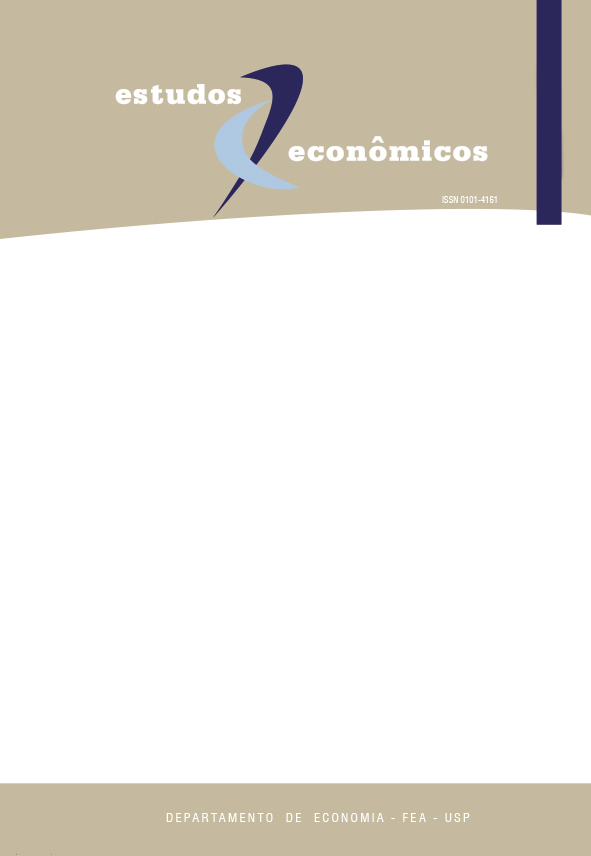Money, credit and business cycles in Marshall
DOI:
https://doi.org/10.1590/0101-416146127sfrKeywords:
money, credit, speculation, commercial cyclesAbstract
This paper reviews Alfred Marshall’s analysis of commercial cycles and the role of both speculation and credit in the different phases of this process. After a brief introduction to the subject, Marshall’s concepts of normal and banking interest rates, as well as his restatement of the Quantity Theory of Money, are discussed. Next, comes his explanation of the business cycles, where the theoretical elements seen in the previous sections are articulated in a single structure. Lastly, Marshall’s monetary theory is nd Knut Wicksell, highlighting the points of convergence, as well as the ones of disagreement, among these prominent neoclassical monetary theorists. A formal dynamic version of the Marshallian model of business cycles is presented in appendix.
Downloads
References
e Mill. In: AMADEO, Edward (Org.). Ensaios sobre economia política moderna: teoria e história
do pensamento econômico. São Paulo: Marco Zero, p. 69-86, 1989.
BARRO, Robert J. Money and the price level under the gold standard. In: B. EICHENGREEN (Ed.).
The gold standard in theory and history. New York: Methuen, p. 81-89, 1985.
BIGG, Robert J. Cambridge and the monetary theory of production: the collapse of Marshallian macroeconomics.
New York: St. Martin’s Press, 1990.
BOIANOVSKY, Mauro. Fisher and Wicksell on money: a reconstructed conversation. European Journal
of the History of Economic Thought, v. 20, n.2, p. 206-237, 2013.
BRIDEL, Pascal. Cambridge monetary thought: the development of saving-investment analysis from
Marshall to Keynes. New York: St. Martin’s Press, 1987.
DARDI, Marco e GALLEGATI, Mauro. Alfred Marshall on speculation. History of Political Economy,
v. 24, n. 2, p. 571-94, 1992.
ESHAG, Eprime. From Marshall to Keynes: an essay on the monetary theory of the Cambridge School.
New York: Augustus Kelley, 1965.
FISHER, Irving. The Purchasing power of money. New York: Macmillan, 1920 [1911].
FORGET, Evelyn. John Stuart Mill’s business cycles. History of Political Economy, v. 22, n. 4, p.
629-642, 1990.
GAREGNANI, Pierangelo. On the present state of the capital controversy. Cambridge Journal of
Economics, v. 36, p. 1417-1432, 2012.
GROENEWEGEN, Peter. A soaring eagle: Alfred Marshall 1842-1924. Aldershot: Edward Elgar, 1995.
HARCOURT, E. C., LANG, N. F. Capital e crescimento econômico. Rio de Janeiro: Interciência, 1978.
HEGELAND, Hugo. The quantity theory of money: a critical study and interpretation and a restatement.
New York: Augustus M. Kelley, 1969.
HUMPHREY, Thomas M.. Fisher and Wicksell on the quantity theory. Federal Research Bank of
Richmond Economic Quarterly, v. 83, n.4, p. 71-90, 1997.
KEYNES, John Maynard. A tract on monetary reform. London: Macmillan, 1923.
KEYNES, John Maynard. A teoria geral do emprego, do juro e da moeda. São Paulo: Nova Cultural,
1996 [1936].
LAIDLER, David. Alfred Marshall and the development of monetary economics. In: J. WHITAKER
(Ed.). Centenary essays on Alfred Marshall. Cambridge: Cambridge University Press, p. 44-77,
1990.
LAIDLER, David. The golden age of the quantity theory. Princeton: Princeton University Press, 1991.
LAIDLER, David. Fabricating the Keynesian revolution: studies of the inter-war literature on money,
the cycle, and unemployment. Cambridge: Cambridge University Press, 1999.
MARSHALL, Alfred. Official papers by Alfred Marshall. London: Macmillan, 1926.
MARSHALL, Alfred. Principles of economics: an introductory volume. London: Macmillan Press,
1977 [1890].
MARSHALL, Alfred. Money credit and commerce. London: Macmillan, [1923] 1929.
MARSHALL, Mary Paley e MARSHALL, Alfred. The economics of industry. Bristol: Thoemmes
Press, 1994 [1879].
MEYRELLES FILHO, Sérgio F. e ARTHMAR, Rogério. Moeda, liquidez e poupança forçada na
economia clássica. Análise Econômica, v. 29, n. 56, p. 153-77, 2011.
MILL, John Stuart. Princípios de economia política: com algumas de suas aplicações à filosofia social.
2 volumes. São Paulo: Nova Cultural, 1996 [1848].
PIGOU, Arthur C. The Value of Money. The Quarterly Journal of Economics, 32(1), Nov., p. 38-65, 1917.
PIGOU, Arthur C. Correctives of the trade cycle. In: W.T. LAYTON (Ed.). Is unemployment inevitable?
London: Macmillan, p. 91-131, 1924.
PIGOU, Arthur C. Industrial fluctuations. London: Frank Cass, 1967 [1927].
REISMAN, David. Alfred Marshall: progress and politics. London: Macmillan, 1987.
RICARDO, David. The high price of bullion. In P. SRAFFA (Ed.). Works, Volume III. 2004.
ROBERTSON, Dennis H. A study of industrial fluctuation: an enquiry into the character and causes
of the so-called cyclical movements of trade. London: The London School of Economics and
Political Science, 1948 [1915].
ROBERTSON, Dennis H. Banking policy and the price level: an essay in the theory of the trade cycle.
London: P.S. King & Son, 1932 [1926].
SRAFFA, Piero (Ed.). The works and correspondence of David Ricardo [Works]. Indianapolis: Liberty
Fund, 2004.
STIGLER, George. The place of Marshall’s Principles in the development of economics. In: J. WHITAKER
(Ed.). Centenary essays on Alfred Marshall. Cambridge: Cambridge University Press, p.
1-13, 1990.
THORNTON, Henry. An enquiry into the nature and effects of the paper credit of Great Britain. London:
Allen & Unwin, 1991 [1802].
WICKSELL, Knut. Interest and prices. A study of the causes regulating the value of money. London:
Macmillan, 1936 [1898].
WICKSELL, Knut. Lectures on political economy. Volume two. Money. Fairfield: Augustus M. Kelley,
1978 [tradução da edição de 1915].
Downloads
Published
Issue
Section
License
Copyright (c) 2016 Sérgio Fornazier Meyrelles Filho, Rogério Arthmar

This work is licensed under a Creative Commons Attribution-NonCommercial 4.0 International License.
By submitting an article, the author authorizes its publication and attests that it has not been submitted to any other journal. The original article is considered final. Articles selected for publication are proofread for grammatical and orthographic errors. The journal does not pay rights for published articles. The Institute of Economic Research from the School of Economics, Business and Accounting of the University of São Paulo (Instituto de Pesquisas Econômicas da Faculdade de Economia, Administração e Contabilidade da Universidade de São Paulo) owns the journal's copyright.




